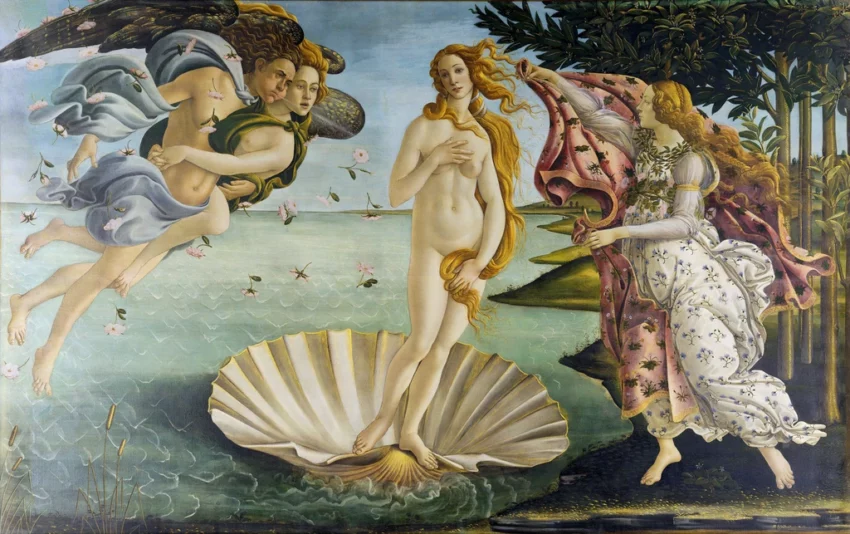Love: A Feeling with Implications

The Birth of Venus (1485-86) by Sandro Botticelli
Neuropsychologists, and those who have given the subject more than a minute’s consideration, have long understood that there is no willful action without some internal motivation (i.e., “feeling”). Moreover, when multiple motivations are in competition, the strongest of the bunch is invariably carried to behavioral fruition. In fact, this phenomenon is occurring within you at the present moment as your brain subconsciously decides whether it ought to endure the prattle of yet another unlettered, run-on sentence from yours truly or go back to Facebook stalking your high school crush (or whatever you weirdos do with your time). The decisive factor is the ratio of favorable to unfavorable neurotransmitters (e.g., dopamine:norepinephrine) that each option stands to offers. All this to say, when people trot out that old adage, “Love is not a feeling; it is an action,” what they really mean is that love, when true, is a feeling so deep and preeminent that, despite whichever superficial emotion happens to plague the moment, its referent remains your “idée fixe,” your principle concern. This carries with it a number of interesting implications: (1) love is not just any old feeling, (2) love is not “achieved,” and (3) love is an illusion without God.
The first implication is a definitional one requiring a degree of precision that the English language, in all its poverty, simply cannot afford, so you’ll forgive me as I resort to Greek instead. On this “theory of Love”, if you will, we will assume the “feeling” itself (what I will henceforth call “Love,” with a capital “L”) is an almost evenly heterogeneous mixture of three composite “loves”: eros, pragma, and agape. Eros in that this Love is, at root, an unmistakably and exclusively passionate one. The carnal nature intrinsic to (and the pedagogic pederastic history latent in) eros is hopefully offset by our second constituent: pragma. Pragma—the love characteristic of long, satisfied marriages, for instance—is practical, steady, rational, and enduring. Finally, Love is part agape, that is, altruistic and unconditional. This, the love of God for man, will only ever be approximated in our earthly relationships. Nevertheless, we now have constructed a subtle, sophisticated Love that defies the extremes of today’s hedonistic culture (eros), yesterday’s anachronistic culture (pragma), and tomorrow’s heavenly culture (agape).
Implication the second: Love does not run on binary. Can we please dispense with this tired, all-or-nothing vocabulary? You do not “fall in Love”; you sink into it as you might a warm bath, one just shallow enough to prevent full immersion. You do not “find Love”; you explore it as you might a new and exotic land, one that stretches on for all eternity. You do not “confess your Love”; you narrate it as you might a suspenseful story, one where rising action never turns to climax. Simply put, there is no limit on Love. The brain is so complex that we could never reach the upper limit of our neural pathways’ ability to grow, both in strength and in number. Furthermore, God is so awesome that even His image could be loved in an infinite amount of ways. I am certain that this alternate conception of Love, if adopted by the masses, would change the way our culture approaches and ends relationships from infatuation then apathy (or worse, disdain) to Love then love.
For our last implication, we turn our attention to God, without whom Love is, in the final analysis, illusory. Allow me to present to you the Moral Argument for the Existence of God: (P1) If God does not exist, objective moral values and duties do not exist; (P2) Objective moral values and duties do exist; (C) Therefore, God exists. Basically, if one regards certain actions as moral or immoral regardless of time, place, or circumstance, then he is saying that morals do not exist in the mind of man but rather are grounded in some transcendent source, some universal (i.e., God). Taking the argument one step further, if God is the source of morality, then He must also be the source of emotions, namely love. After all, how might one separate a moral/loving act from the love that compelled it? For example, there is no morality in saving a child from drowning if doing so was merely an evolved reflex. And worse, if the act was performed in malice—perhaps with intent to rape the rescued child—it would be positively immoral. Love is, therefore, the bedrock of morality, and since God is the standard of morality, He is by necessity also (the standard of) love itself—a formula which works almost just as well in the reverse. This, of course, includes the (romantic) Love that we have been discussing all along; God is the original groom, and we his bride (Ephesians 5:22-33).
Love: call it feeling, call it action, call it whatever you desire, but please, may we never turn a blind eye to its implications. It shapes almost every aspect of our lives, individual and collective, as it is also the raw material that forms, and the glue that holds together, the most basic structural unit of society: the family. If we take it for any old emotion, we are bound to hurt both ourselves and others when we discover on pain of heartbreak that it is anything but. It would be like a doctor taking a scalpel to be any old instrument when it is, in reality, at once the most dangerous and most life-saving tool in his collection. Furthermore, if we greedily grasp for Love in full, we will miss even the part. Just like the monkey with fist clenched in jar of rice, better to enjoy a little than lose everything. Finally, if we forget who gave us Love, we will forget how to Love. Because Love without right and wrong is about as meaningful as a compass without north and south. And, no, I will not apologize for my excessive use of analogy; it is the language of Love.
… Okay, now you have my permission to go back to Facebook stalking your high school crush.




Leave a Reply